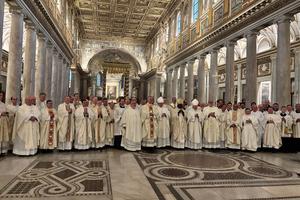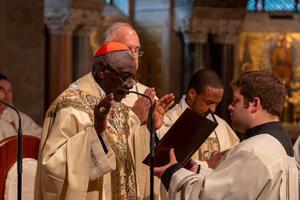Cardinal Sarah: ISIS and Gender Ideology Are Like 'Apocalyptic Beasts'
Full text of synod intervention reveals the cardinal spoke of need to proclaim beauty of monogamy and family and called for more respect and transparency among synod fathers.

In his synod intervention given last week, Cardinal Robert Sarah said the idolatry of Western freedom and Islamic fundamentalism are "almost like two apocalyptic beasts” and similar to Nazism and Communism.
The Guinean cardinal also called on the Church to proclaim the "transforming power of faith and the Gospel" clearly and without fear.
According to the full text of his intervention (see below), given to the Register and Aleteia, the prefect of the Congregation for Divine Worship said “we find ourselves between gender ideology and ISIS”.
Islamic massacres and libertarian demands “regularly contend for the front pages of the newspapers”, he said, and pointed to June 26 this year. So-called Ramadan terrorist attacks in France, Kuwait, Somalia, and Tunisia, took place that day, as did the Supreme Court decision allowing same-sex “marriage” nationwide.
“From these two radicalizations arise the two major threats to the family: its subjectivist disintegration in the secularized West through quick and easy divorce, abortion, homosexual unions, euthanasia et cetera," Cardinal Sarah said, and cited as examples gender theory, the 'Femen' radical feminist group, the LGBT lobby, and the International Planned Parenthood Federation.
“On the other hand,” he said, there is the “pseudo-family of ideologized Islam which legitimizes polygamy, female subservience, sexual slavery, child marriage." He said he was referring to Al Qaeda, Isis, Boko Haram and other similar groups.
The West African cardinal said “several clues” allow one to intuit the very “demonic origin” of these two movements.
Unlike the Spirit of Truth that promotes communion, he said “these encourage confusion” and demand a “universal and totalitarian rule.” They are “violently intolerant, destroyers of families, society and the Church, and are openly Christianophobic,” he said.
“We are not contending against creatures of flesh and blood.”
He continued: “We need to be inclusive and welcoming to all that is human; but what comes from the Enemy cannot and must not be assimilated,” he continued. “You cannot join Christ and Belial [prince of darkness]! What Nazi-Fascism and Communism were in the 20th century, Western homosexual and abortion Ideologies and Islamic Fanaticism are today.”
He closed by saying “we must proclaim the truth without fear, the plan of God, which is monogamy in conjugal love open to life.”
The cardinal also called for “strong and clear” teaching from the magisterium of the Church, adding that all pastors “have the mission of helping our contemporaries to discover the beauty of the Christian family.”
***
Also in his intervention, Cardinal Sarah first made a point of calling for "more transparency and respect among us." He voiced concern about some of the synod procedures which, he said, “did not seem aimed at enriching discussion and Communion as much as they did to promote a way of seeing typical of certain fringe groups of the wealthiest churches.”
The cardinal was primarily referring to the Church in Germany whose hierarchy has largely been pushing for Holy Communion for civilly remarried divorcees and Church validations of same-sex unions. Opponents say both practices would be in grave opposition to the Church’s magisterium.
Cardinal Sarah said “this is contrary to a poor Church, a joyously evangelical and prophetic sign of contradiction to worldliness.” He also said he did not understand “why some statements that are not shared by the qualified majority of the last Synod still ended up in the Relatio and then in the Lineamenta and the Instrumentum laboris when other pressing and very current issues (such as gender ideology) are instead ignored.”
He said his “first hope”, therefore, was that the synod would show more “freedom, transparency and objectivity,” and he asked that the summaries of the interventions be published “to facilitate discussion and avoid any prejudice or discrimination in accepting the pronouncements of the synod Fathers.”
***
Speaking to the Register and Aleteia at the end of a meeting of African bishops on Saturday, Cardinal Sarah said that by retaining the three controversial paragraphs in the instrumentum laboris, he believes "there is an agenda they are trying to impose.”
He said this second week of the synod would be “difficult”, as the meeting moves to discuss the “gravest and most serious” part: the third part of the instrumentim laboris. Issues discussed will impinge most on doctrine and so “will take more time,” he said. “They will also allow the invited delegates to speak.”
He said that during the first week, the accent “was also on doctrine in all the reports.” He said the interventions on the second part of the document were “ along a good line.” He added there were still bishops’ conferences “some, not all” in the West that “want to open the doors [to everything], but they are few.” The bishops of the “East are orthodox,” he said, as are “Africa, America.”
Overall, Cardinal Sarah stressed the need to “insist on God’s plan for the family, because we began in a somewhat mistaken way. We need to begin with God’s plan for the family. Instead we began by looking at the difficulties. I don’t think it was a good way to start. But even so, in this moment I saw that the Holy Spirit was guiding it well.”
***
Intervention of Robert Cardinal Sarah, Prefect of the Congregation for Divine Worship and the Discipline of the Sacraments
Ordinary Synod on the Family, October 2015 [emphases his]
Your Holiness, Your Eminences, Your Excellencies, participants of the Synod,
I propose these three thoughts:
1. More transparency and respect among us
I feel a strong need to invoke the Spirit of Truth and Love, the source of parrhesia in speaking and humility in listening, who alone is capable of creating true harmony in plurality.
I say frankly that in the previous Synod, on various issues one sensed the temptation to yield to the mentality of the secularized world and individualistic West. Recognizing the so-called “realities of life” as a locus theologicus means giving up hope in the transforming power of faith and the Gospel. The Gospel that once transformed cultures is now in danger of being transformed by them. Furthermore, some of the procedures used did not seem aimed at enriching discussion and communion as much as they did to promote a way of seeing typical of certain fringe groups of the wealthiest churches. This is contrary to a poor Church, a joyously evangelical and prophetic sign of contradiction to worldliness. Nor does one understand why some statements that are not shared by the qualified majority of the last Synod still ended up in the Relatio and then in the Lineamenta and the Instrumentum laboris when other pressing and very current issues (such as gender ideology) are instead ignored.
The first hope is therefore that, in our work, there by more freedom, transparency and objectivity. For this, it would be beneficial to publish the summaries of the interventions, to facilitate discussion and avoid any prejudice or discrimination in accepting the pronouncements of the synod Fathers.
2. Discernment of history and of spirits
A second hope: that the Synod honor its historic mission and not limit itself to speaking only about certain pastoral issues (such as the possible communion for divorced and remarried) but help the Holy Father to enunciate clearly truths and real guidance on a global level. For there are new challenges with respect to the synod celebrated in 1980. A theological discernment enables us to see in our time two unexpected threats (almost like two “apocalyptic beasts”) located on opposite poles: on the one hand, the idolatry of Western freedom; on the other, Islamic fundamentalism: atheistic secularism versus religious fanaticism. To use a slogan, we find ourselves between “gender ideology and ISIS”. Islamic massacres and libertarian demands regularly contend for the front page of the newspapers. (Let us remember what happened last June 26!). From these two radicalizations arise the two major threats to the family: its subjectivist disintegration in the secularized West through quick and easy divorce, abortion, homosexual unions, euthanasia etc. (cf. Gender theory, the ‘Femen’, the LGBT lobby, IPPF ...). On the other hand, the pseudo-family of ideologized Islam which legitimizes polygamy, female subservience, sexual slavery, child marriage etc. (cf. Al Qaeda, Isis, Boko Haram ...)
Several clues enable us to intuit the same demonic origin of these two movements. Unlike the Spirit of Truth that promotes communion in the distinction (perichoresis), these encourage confusion (homo-gamy) or subordination (poly-gamy). Furthermore, they demand a universal and totalitarian rule, are violently intolerant, destroyers of families, society and the Church, and are openly Christianophobic.
“We are not contending against creatures of flesh and blood ....” We need to be inclusive and welcoming to all that is human; but what comes from the Enemy cannot and must not be assimilated. You can not join Christ and Belial! What Nazi-Fascism and Communism were in the 20th century, Western homosexual and abortion Ideologies and Islamic Fanaticism are today.
3. Proclaim and serve the beauty of Monogamy and the Family
Faced with these two deadly and unprecedented challenges (“homo-gamy” and “poly-gamy”) the Church must promote a true “epiphany of the Family.” To this both the Pope (as spokesman of the Church) may contribute, and individual Bishops and Pastors of the Christian flock: that is, “the Church of God, which he has obtained with his own blood” (Acts: 20:28).
We must proclaim the truth without fear, i.e. the Plan of God, which is monogamy in conjugal love open to life. Bearing in mind the historical situation just recalled, it is urgent that the Church, at its summit, definitively declare the will of the Creator for marriage. How many people of good will and common sense would join in this luminous act of courage carried out by the Church!
Together with a strong and clear Word of the Supreme Magisterium, Pastors have the mission of helping our contemporaries to discover the beauty of the Christian family. To do this, it must first promote all that represents a true Christian Initiation of adults, for the marriage crisis is essentially a crisis of God, but also a crisis of faith, and this is an infantile Christian initiation. Then we must discern those realities that the Holy Spirit is already raising up to reveal the Truth of the Family as an intimate communion in diversity (man and woman) that is generous in the gift of life. We bishops have the urgent duty to recognize and promote the charisms, movements, and ecclesial realities in which the Family is truly revealed, this prodigy of harmony, love of life and hope in Eternity, this cradle of faith and school charity. And there are so many realities offered by Providence, together with the Second Vatican Council, in which this miracle is offered.
Translation from Italian by Diane Montagna.
















